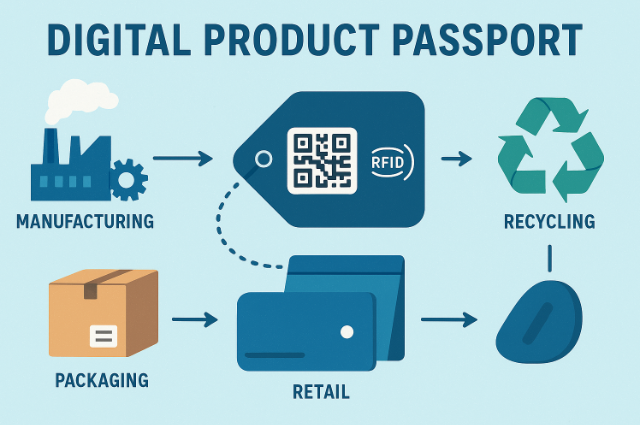
A virtual product passport (dpp) is sort of a virtual identification card that travels with a product at some stage in its life. It stores crucial statistics about the product’s beginning, materials, manufacturing process, usage, renovation, and end-of-life handling, along with recycling or disposal. Typically reachable through codes, barcodes, or electronic tags, the DPP gives transparency by means of allowing agencies or clients to scan and access dependable, up-to-date information approximately a product’s history and environmental impact. It was specifically introduced below the EU’s green tasks to sell sustainability, reduce waste, and help a circular economic system with the aid of making product traceability and transparency less complicated than ever. Virtual product passports (DPPS) do more than sell transparency; they're powerful equipment that assist agencies to live compliant with strict environmental suggestions at the same time as enhancing operational efficiency.
Via offering correct, actual-time facts about every level of a product’s lifecycle, dpps permit companies to display sustainability metrics, ensure legal compliance under European Round Economic System legal guidelines, and become aware of inefficiencies in production or supply chains. This allows for less waste, reduces charges, and saves you from counterfeiting. Furthermore, they aid quicker recollection and better first-rate manipulation, reworking conventional products into digital belongings that promote smarter decision-making and more customer satisfaction, paving the way for a greener and more responsible economy.
DPPs also increase transparency, trust, and sustainability in the course of the product lifecycle. They provide information on materials, sourcing, manufacturing, and environmental impact, allowing a beautiful supply chain visibility, track and optimise resources, minimise waste, and ensure compliance with hard rules like the EU’s circular economy movement plan. They also protect manufacturers against counterfeiting by way of securely authenticating merchandise. Additionally, dpps open new opportunities for consumer engagement, letting brands percentage stories, offer repair info, and build loyalty through personalised digital reports. By turning products into smart, traceable virtual belongings, dpps assist a greener financial system and more potent customer relationships. By storing targeted information about a product’s materials, manufacturing, utilisation, and recycling options in one digital document, dpps empower smarter decisions that expand product lifestyles through repair, reuse, and remanufacturing. This transparency helps reduce waste, conserve resources, and ensure regulatory compliance, particularly in European sustainability projects.
DPPs also enhance collaboration throughout the delivery chain by way of allowing smooth information sharing while shielding privations and highbrow assets. This related machine now not only drives sustainability innovation, but additionally enables Customers to make greener picks, turning products into treasured property in preference of disposable items. But enforcing DPPs is complex. Organisations ought to manage large quantities of diverse data from multiple providers with extraordinary structures and requirements. Ensuring record accuracy and verification is important, as mistakes can result in regulatory problems. Enforcing DPPs calls for funding in technology like blockchain or RFID, in addition to coordination alongside the supply chain to unify and verify product information securely. Any other predominant venture is defining a duty particularly for merchandise made from various components sourced from unique providers. Debates remain over who has to create and replace the entire DPP: the very last producer or the person thing providers. Without clear possession and interoperability requirements, records can also become fragmented, decreasing the passport’s value for transparency and circularity. Achievement relies upon adopting standardised virtual systems that permit authorised stakeholders to gain access to and update product information effectively. Finally, companies need to reconsider their inner processes to manage DPPs effectively. This includes training employees on records management gear, enhancing collaboration between supply chain, it, and sustainability departments, and making an investment in scalable systems for long-term period statistics storage. At the same time as initial setup expenses can be high, dpps ultimately construct consideration and transparency with the aid of supplying customers and agencies with confirmed access to a product’s complete story from sourcing and production to sustainability and recyclability. This allows brands to prove their environmental claims, prevent counterfeit products, beautify patron engagement, and streamline delivery chains for better performance and compliance. Via turning products into traceable virtual belongings, dpps open new possibilities for circular financial system models and more potent consumer loyalty. Implementing Digital Product Passports (DPPs) is a complicated but critical step towards sustainability and transparency that calls for overcoming numerous technical and organisational challenges. For starters, DPPs should cope with large portions of one-of-a-kind product facts from more than one additive and provider, which means that agencies want standardised, interoperable systems to collect, process, and update this information regularly and securely. Many groups conflict due to the reality that they have access to product records in incompatible formats or lack experienced digital storage and processing abilities. On top of that, coordinating with supply chain partners to make sure accurate and nicely timed entries into the DPP demands strong collaboration and alignment on statistical duties. Furthermore, organisations ought to balance transparency with data protection, safeguarding sensitive layout or compliance information, even while making enough details accessible for regulators and clients. Even with those hurdles, investing in the proper solutions and training teams across departments can turn DPPs into a powerful system that beautifies compliance, reduces waste, and enhances product lifecycle manipulate, and construct deeper beliefs with eco-aware customers, all key to thriving in a round monetary machine.
